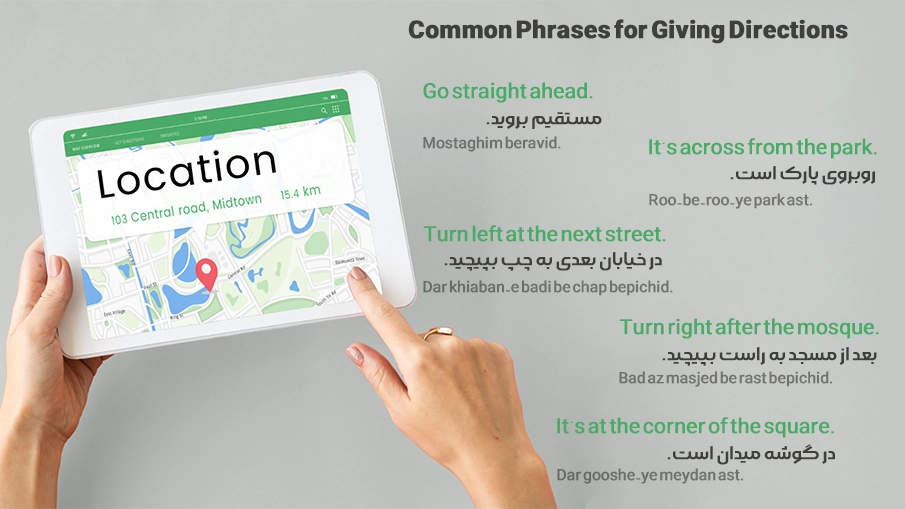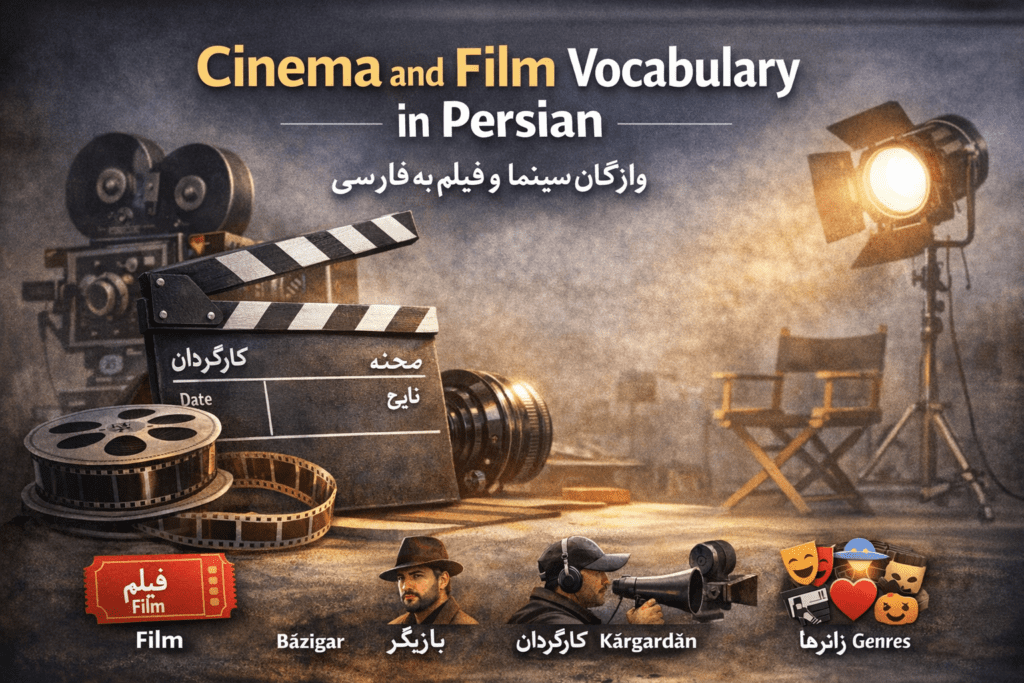Navigating a new place often requires understanding and asking for directions. Learning to give and understand directions in Farsi makes your travels in Persian-speaking countries smoother and helps you connect with the local culture.
From bustling bazaars to ancient landmarks, communicating effectively about directions enhances your overall experience. Whether you’re a tourist, a student, or an expat, this guide provides the tools to navigate Persian-speaking regions confidently.
Introduction to Giving Directions in Farsi
Farsi, the beautiful and expressive language spoken predominantly in Iran, Afghanistan, and Tajikistan, is rich in culture and utility.
One of the most practical aspects of learning Farsi is mastering how to ask for and give directions. Knowing the right phrases for asking directions can save you time, reduce frustration, and foster meaningful interactions with locals.
Navigating Iran’s vibrant cities like Tehran or Shiraz can be overwhelming for non-Farsi speakers. However, a few simple phrases can make a world of difference.
Let’s dive into the key expressions, cultural tips, and practical advice to help you confidently find your way.
Why Learn Directions in Persian Language?
Traveling becomes a breeze when you can ask locals for the quickest route to a destination. Instead of relying solely on maps, you gain the flexibility to explore hidden gems off the beaten path.
Cultural Engagement
Persians are known for their hospitality. Asking for directions provides an opportunity to engage with locals and experience their warmth firsthand.
Practicality in Daily Life
For expats or students in a Persian-speaking country, knowing how to ask for and give directions is essential for navigating everything from grocery shopping to attending classes.
Key Vocabulary for Directions in Farsi
Before jumping into sentences, understanding basic directional vocabulary is crucial. Here’s a list of commonly used words:
| English | Farsi | Pronunciation |
| Street | خیابان | Khiaban |
| Square | میدان | Meydan |
| Park | پارک | Park |
| Mosque | مسجد | Masjed |
| Near | نزدیک | Nazdik |
| Far | دور | Door |
| Left | چپ | Chap |
| Right | راست | Rast |
| Forward | مستقیم | Mostaghim |
| Turn | بپیچید | Bepichid |
How to Ask for Directions in Farsi
Persian culture values politeness, so start your inquiry with a courteous phrase:
-
- Excuse me, where is…?
ببخشید، … کجاست؟ (Bebakhshid, … kojast?)
- Excuse me, where is…?
-
- How can I get to…?
چطور میتوانم به … بروم؟ (Chetor mitavanam be … beravam?)
- How can I get to…?
Examples
-
- Excuse me, where is the nearest park?
ببخشید، نزدیکترین پارک کجاست؟ (Bebakhshid, nazdiktarin park kojast?)
- Excuse me, where is the nearest park?
-
- How can I get to the bazaar?
چطور میتوانم به بازار بروم؟ (Chetor mitavanam be bazar beravam?)
- How can I get to the bazaar?
Tips for Clarity
If you’re asking someone who seems busy, keep it brief. Use landmarks like squares, streets, or popular places as references.
How to Understand Directions in Farsi
When locals respond, they may babble or use terms unfamiliar to them. Here are strategies to improve comprehension:
- Listen for Key Terms
Focus on directional words such as left (chap), right (rast), and forward (mostaghim).
- Ask for Repetition
-
لطفاً دوباره بگویید. (Lotfan dobare begouid.)
Translation: Please say that again.
- Request Slower Speech
-
لطفاً آرامتر صحبت کنید. (Lotfan aram-tar sohbat konid.)
Translation: Please speak more slowly.
- Use Gestures
Often, people will accompany their directions with hand gestures. Pay close attention to these non-verbal cues.
How to Give Directions in Farsi
If someone asks you for directions, you might want to respond confidently. Here’s how you can guide them:
Common Phrases for Giving Directions

- Go straight ahead.
-
- مستقیم بروید. (Mostaghim beravid.)
- Turn left at the next street.
-
- در خیابان بعدی به چپ بپیچید. (Dar khiaban-e badi be chap bepichid.)
- Turn right after the mosque.
-
- بعد از مسجد به راست بپیچید. (Bad az masjed be rast bepichid.)
- It’s across from the park.
-
- روبروی پارک است. (Roo-be-roo-ye park ast.)
- It’s at the corner of the square.
-
- در گوشه میدان است. (Dar gooshe-ye meydan ast.)
Cultural Insights for Giving Directions in Farsi
Iranians are known for their hospitality, so they often go out of their way to help. A simple “Thank you” (متشکرم, Motashakeram) can go a long way.
Use Landmarks
Directions in Persian culture often involve prominent landmarks like mosques, shops, or squares. Even if you’re unsure of street names, mentioning recognizable places can help.
Expect Extra Help
Don’t be surprised if someone offers to walk with you to your destination. This is a common practice and reflects the kindness of Persian culture.
Practice Scenarios for Farsi Directions
Scenario 1: Asking for the Market
You’re in a small town and want to find the local market.
-
- You: ببخشید، بازار کجاست؟ (Bebakhshid, bazar kojast?)
-
- Local: مستقیم بروید، بعد از مسجد به راست بپیچید. (Mostaghim beravid, bad az masjed be rast bepichid.)
Translation: Go straight, and turn right after the mosque.
Scenario 2: Guiding to the Bus Station
A tourist asks you how to get to the bus station.
-
- Tourist: ببخشید، ایستگاه اتوبوس کجاست؟ (Bebakhshid, istgah-e otobus kojast?)
-
- You: مستقیم بروید، روبروی پارک است. (Mostaghim beravid, rooberoo-ye park ast.)
Translation: Go straight; it’s across from the park.
Using Maps and Technology in Farsi
While traditional map-reading is less common in the digital age, learning how to communicate about maps in Farsi can still be useful:
-
- Can you show me on the map?
-
- میتوانید روی نقشه به من نشان دهید؟ (Mitoonid rooye naghshe be man neshan dahid?)
-
- Can you show me on the map?
Many apps like Google Maps now support Farsi for navigation, making it easier for tourists and learners alike. However, having offline vocabulary knowledge remains invaluable when technology fails or isn’t available.
Learning Directions with Danaa School
Danaa School offers structured Farsi courses tailored for travelers and learners. Their language programs emphasize practical communication, including navigating streets, shopping, and engaging with locals. Interactive lessons, real-life scenarios, and cultural immersion make it easier to master Persian direction phrases.
Find Your Ideal Teacher
At Danaa School, you can choose your Farsi tutor from a selection of qualified and experienced teachers. Begin an exceptional journey into the world of Persian language!
Book Your Trial Lesson
Common Challenges When Learning Directions in Farsi
- Understanding Fast Responses
Locals may speak quickly or use regional dialects. Polite repetition requests help bridge the gap.
- Pronunciation
Persian pronunciation can be tricky. Practice with native speakers or audio tools to get the accent right.
- Over-Reliance on Technology
While apps are convenient, being able to navigate without them ensures independence and deeper cultural immersion.
FAQs
How do I say "Excuse me" in Farsi when asking for directions?
Say ببخشید (Bebakhshid) before your question to be polite.
What’s the best way to clarify unclear directions in Persian?
Ask them to repeat or speak more slowly: لطفاً دوباره بگویید. (Lotfan dobare begouid.)
How do I indicate I didn’t understand in Farsi?
Use “I didn’t understand”: من متوجه نشدم. (Man motevajeh nashodam.)
Are locals in Iran helpful with directions?
Yes, Iranians are typically very helpful and may even accompany you partway to your destination.
What apps can help with Farsi navigation?
Google Maps supports Farsi navigation, and offline apps like Persian Phrasebook are also handy.
How do I practice Farsi directions effectively?
Role-play with a partner, use language apps, or join a course like Danaa School for hands-on learning.
Conclusion
Mastering how to ask for and give directions in Farsi is essential for anyone exploring Persian-speaking regions. This knowledge enhances not just navigation but also cultural understanding and personal connections.
Whether planning a trip or learning for personal growth, the ability to confidently handle directions in Farsi ensures smoother and more enriching experiences. Enroll now.
Want to Learn Farsi at Danaa School?
Here are the best resources for you!









